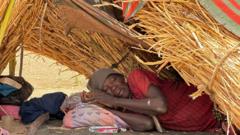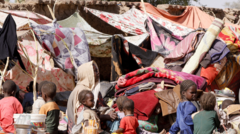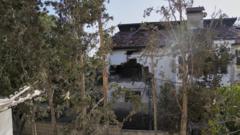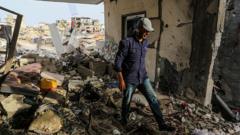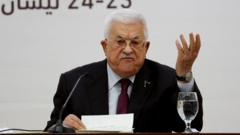The Israeli military's recent airstrike in Gaza claimed the lives of the head of Hamas's police force and his deputy, igniting clashes between narratives of military necessity and civilian safety. As casualties rise, particularly among children, the situation presents growing humanitarian challenges in a region already devastated by conflict.
Israeli Airstrike Kills Hamas Police Chief, Raising Humanitarian Concerns in Gaza**
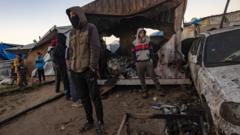
Israeli Airstrike Kills Hamas Police Chief, Raising Humanitarian Concerns in Gaza**
An Israeli airstrike targeting Hamas police leaders results in multiple fatalities, igniting debates over the impact on civilians in Gaza and escalating humanitarian crises.
The chief of the Hamas-run police force in Gaza, Mahmoud Salah, along with his deputy, Hussam Shahwan, was reportedly killed in an Israeli strike targeting a tent camp that housed displaced families. This incident has drawn condemnation from the Hamas-run interior ministry, which labeled the operation an "assassination," asserting that both men were engaged in humanitarian duties and protecting their community. The attack also left nine others dead, including three brothers aged seven to thirteen, underscoring the tragic human cost of military operations in densely populated areas.
Israeli military sources confirmed the strike, alleging it was aimed at Shahwan, who they accused of collaborating with Hamas's military wing to plan attacks against Israeli forces. The Israeli Defense Forces (IDF) claimed to have taken considerable measures to minimize civilian casualties prior to the airstrike, which they positioned within the context of ongoing hostilities against Hamas, particularly in response to recent attacks on southern Israel. Reports indicate that more than 30 people were killed in various airstrikes across Gaza on the same day.
Amid these military actions, communities in Gaza face increasing despair compounded by worsening humanitarian conditions. Recent cold weather has resulted in flooding of shelters, with more than 1,500 tents reportedly inundated, leaving families submerged in raw sewage. The ongoing conflict has displaced thousands, and the lack of adequate shelter has further deteriorated living conditions in Gaza.
The aftermath of this airstrike is highlighting contrasting narratives: while Israeli authorities defend their operations as essential for national security, Palestinian groups and human rights advocates argue that such actions exacerbate civilian suffering and claims that police forces in Gaza serve primarily as community protection entities are undermined by military tactics that target them directly.
As violence escalates, questions of safety, legality, and ethics loom large, with international observers calling for renewed focus on humanitarian consequences and the need for de-escalation in a protracted and devastating conflict.


